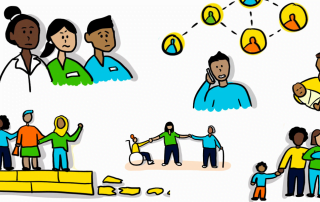Biting the hand that feeds you?: The isolation of women and racialized managers
Top managers may have trouble keeping the support of managers who helped them as they moved up the corporate ladder. This study shows that these challenges are especially salient for women and racial minority executives.
How international trade shapes gender gaps in employment
This study examines how international trade impacts men and women’s employment security differently.
Is “good” care possible in the face of racism?
This study explores how migrant African care workers face “everyday racism” masked as care receivers’ personal preferences.
The Future of Work: Will Remote Work Help or Hinder the Pursuit of Equality?
How have marginalized workers specifically been affected by the shift to working from home? Our report on the future of work highlights how remote work could help the pursuit of equality.
Care Work in the Recovery Economy: Towards a Caring Economy
As society emerges from COVID-19 into a recovery economy, questions about the future of care also emerge. What organizational and policy changes are needed to ensure that care work and caregiving is more equal and sustainable?
Guarding against workplace sexual harassment
This study shows how women workers deal with unwanted, ambiguous sexual interactions through protective behaviours that may limit their career advancement.








